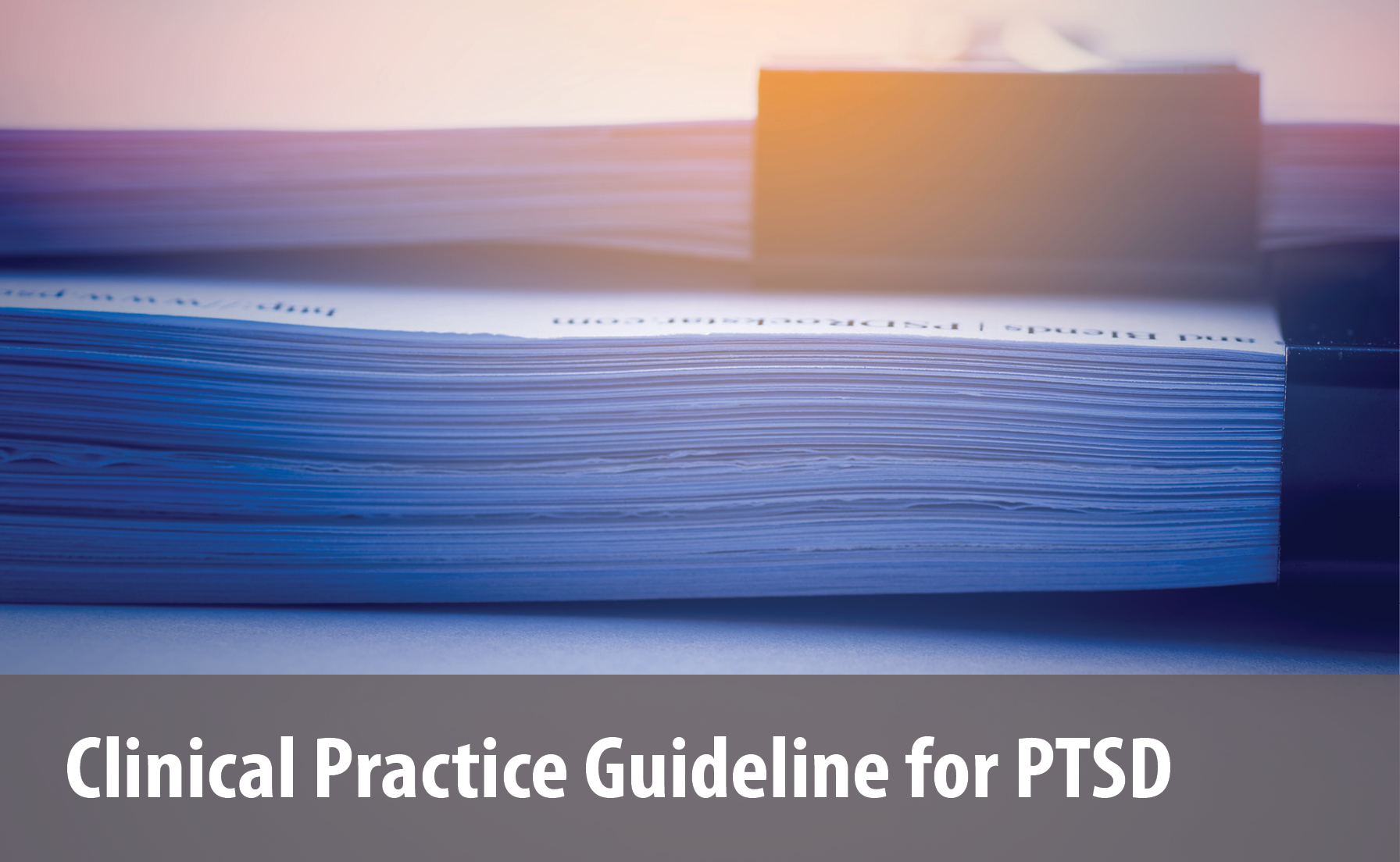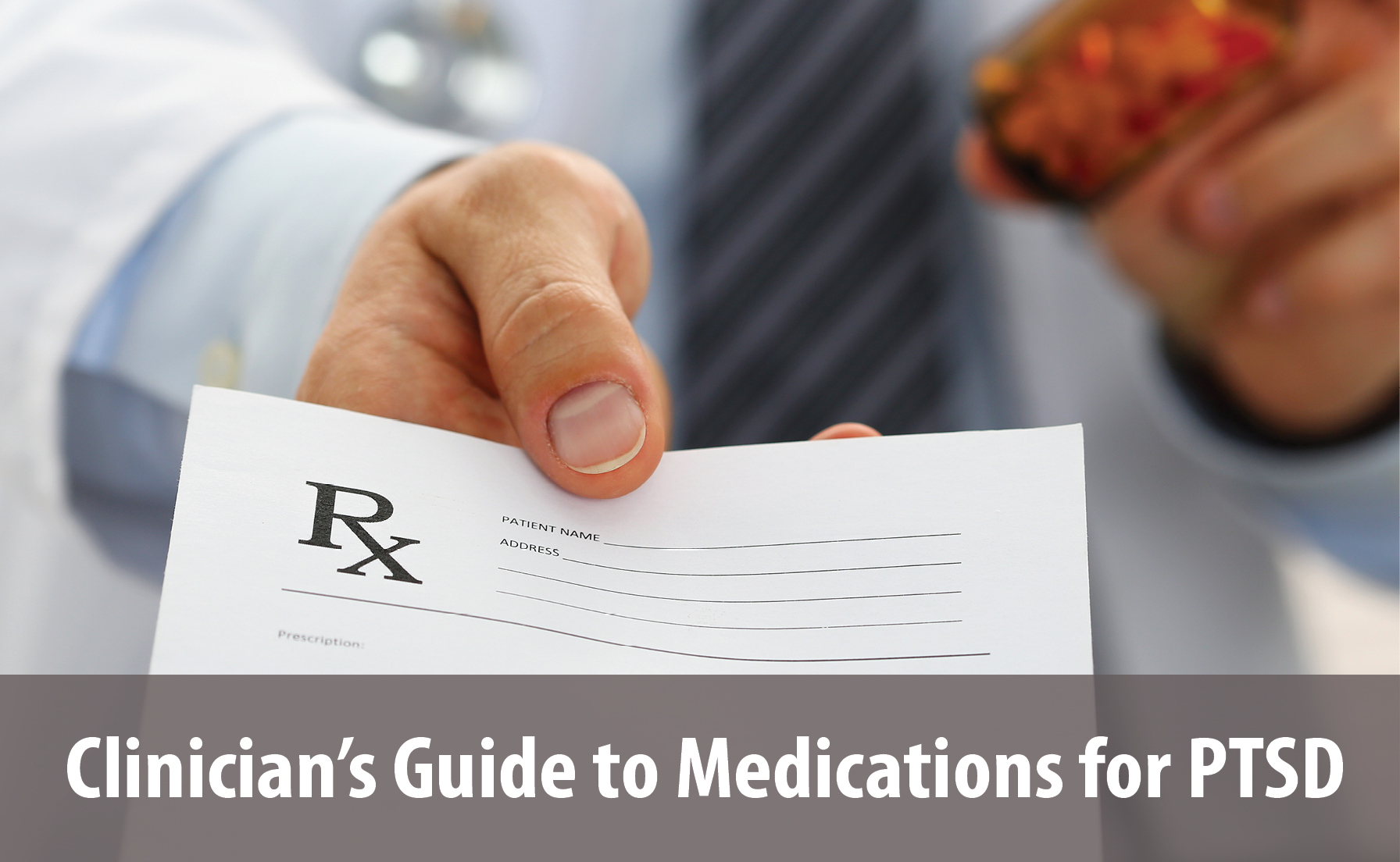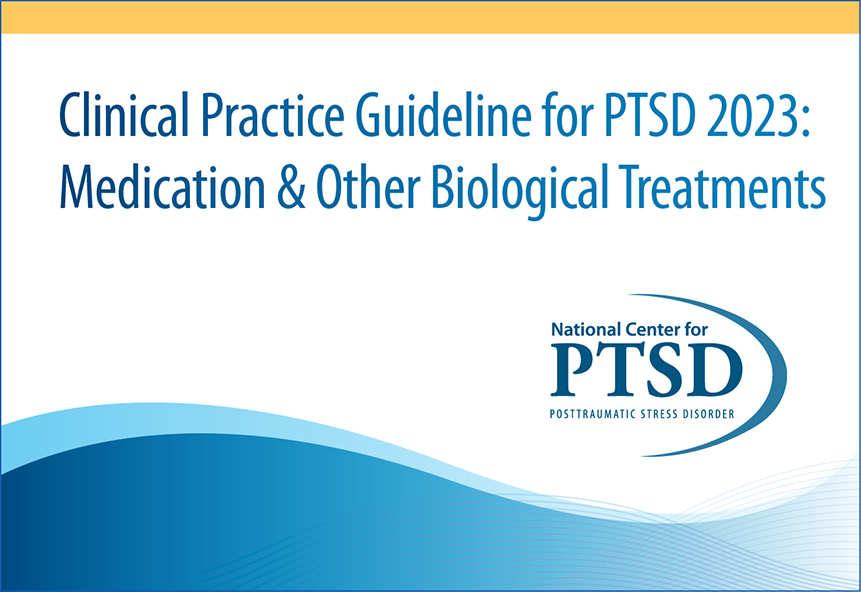PTSD: National Center for PTSD
Clinician's Guide to Medications for PTSD
Clinician's Guide to Medications for PTSD
The 2023 VA/DoD Clinical Practice Guideline (CPG) for PTSD recommends specific trauma-focused psychotherapies as first-line treatments for PTSD over pharmacotherapy (1). Medications are an effective treatment option when these trauma-focused psychotherapies are not available or feasible when patients prefer medications. PTSD also carries high levels of psychiatric comorbidities, such as depression, which may be treated with medication.
Topics in the Clinician's Guide
Overview
Medications prescribed for PTSD act upon neurotransmitters affecting the fear and anxiety circuitry of the brain including serotonin, norepinephrine, gamma-aminobutyric acid (GABA), the excitatory amino acid glutamate and dopamine, among others. Evidence for PTSD pharmacology is strongest for specific selective serotonin reuptake inhibitors (SSRIs)--sertraline (Zoloft) and paroxetine (Paxil)--and a particular serotonin norepinephrine reuptake inhibitor (SNRI), venlafaxine (Effexor) (1,2). Currently, only sertraline and paroxetine are approved by the Food and Drug Administration (FDA) for PTSD. From the FDA perspective, all other medication uses are off label.
Continuing Education Course
Clinical Practice Guideline for PTSD 2023: Medication & Other Biological Treatments
This online course reviews the 2023 VA/DoD CPG development process and recommendations for psychopharmacology (and biological treatments) for the treatment of PTSD.
Medication Monotherapy for the Treatment of PTSD
2023 VA/DoD Clinical Practice Guildline: Medication monotherapy for the primary treatment of PTSD by recommendations and strength evidence
| Quality of Evidence* |
Recommend For | Suggest For | Suggest Against | Recommend Against |
Recommend Neither For Nor Against |
||||||
|---|---|---|---|---|---|---|---|---|---|---|---|
| High | None | None | None | None | None | ||||||
| Moderate | paroxetine^, sertraline^, venlafaxine | None | None | None | None | ||||||
| Low | None | prazosin (only for the treatment of PTSD-associated nightmares) | None | None | None | ||||||
| Very Low | None | None | divalproex, guanfacine, ketamine, risperidone, tiagabine, vortioxetine, prazosin (for the treatment of PTSD) | benzodiazepines, cannabis (or cannabis derivatives)‡ | amitriptyline±, bupropion±, buspirone, citalopram±, desvenlafaxine, duloxetine, escitalopram, eszopiclone±, fluoxetine, imipramine±, lamotrigine±, mirtazapine±, nefazodone±, olanzapine±, phenelzine±, pregabalin±, quetiapine±, rivastigmine, topiramate | ||||||
| No Data | None | None | None | None | ayahuasca‡ , dimethyltryptamine‡ , ibogaine‡ , lysergic acid diethylamide (LSD) ‡ , psilocybin‡ | ||||||
|
Key: * The Work Group determined there was no high-quality evidence regarding medication monotherapy. ^ FDA approved for PTSD. ± Clinicians should strongly consider potential adverse effects. ‡ Studies of these drugs did not meet the inclusion criteria for the systematic evidence review due to poor quality. |
|||||||||||
Selective serotonin reuptake inhibitors (SSRIs)
The 2023 VA/DoD CPG recommends 2 SSRIs (sertraline and paroxetine) as having the most robust empirical evidence for reducing PTSD symptoms in randomized controlled trials (RCTs) utilizing clinician-rated assessments and considering potential harms. There was insufficient evidence to recommend for or against 3 other SSRIs: citalopram (Celexa), escitalopram (Lexapro), and fluoxetine (Prozac) (1). Note that fluoxetine was downgraded from the 2017 VA/DoD CPG.
Benefit from SSRI treatment depends upon adequate dosages and duration of treatment. Dosage ranges for the strongly recommended SSRIs are:
- sertraline (Zoloft) 50 mg to 200 mg daily
- paroxetine (Paxil) 20 to 60 mg daily
Exceptions may occur for patients based upon their individual histories of side effects, response, comorbidities and personal preferences. An example of an exception would be a patient with PTSD and co-occurring bipolar disorder, where an antidepressant could cause mood instability which could be mitigated with a mood stabilizing medication (such as lithium or an anti-epileptic medication) before prescribing SSRIs. However, there is evidence that different antidepressants have varying effects on destabilizing mood in bipolar disorder (3). Another example would be intolerable sexual dysfunction or gastrointestinal side effects due to the effects of increased serotonin levels in the peripheral nervous system. Each patient varies in their response and ability to tolerate a specific medication and dosage, so medications must be tailored to individual needs.
The guideline recommends against use of the novel SSRI vortioxetine (Trintellix). A 2021 randomized, placebo-controlled trial of the vortioxetine in PTSD found no difference in CAPS-5 scores after 12 weeks (4).
Serotonin and norepinephrine reuptake inhibitors (SNRIs)
Venlafaxine (Effexor) acts primarily as a serotonin reuptake inhibitor at lower dosages and as a combined serotonin and norepinephrine reuptake inhibitor at higher dosages. It is a strongly recommended treatment for PTSD in the 2023 VA/DoD CPG based upon large multi-site RCTs (2). The target dosage is:
- venlafaxine (Effexor) 75 mg to 300 mg daily
The 2023 VA/DoD CPG finds insufficient evidence to recommend for or against 2 other SNRIs: desvenlafaxine (Pristiq) and duloxetine (Cymbalta) (1).
Other antidepressants for PTSD
The 2023 VA/DoD CPG found insufficient evidence to recommend for or against several other antidepressants with diverse mechanisms of action, especially when considered in light of potential harms. Medications in this group include amitriptyline, bupropion, and mirtazapine (1). Nefazodone, phenelzine (Nardil), and imipramine (Tofranil) are also neither recommended for nor against by the guideline, a change from a weak for recommendation in 2017. Since major depressive disorder is highly comorbid in patients with PTSD, use of antidepressants other than the 3 recommended for the treatment of PTSD may be warranted to treat comorbid depression.
The 2023 VA/DoD CPG does not address the use of the novel antidepressant esketamine (Spravato) for PTSD but does recommend against the use of the anesthetic ketamine, of which esketamine is an enantiomer. Clinical trials of ketamine for the treatment of PTSD have not demonstrated a clear benefit (1). The absence of evidence for efficacy and the risks and side effect burden of ketamine (5,6) resulted in the recommendation against ketamine as a treatment for PTSD. However, as above, ketamine and esketamine may be indicated for the treatment of comorbid medication-resistant major depressive disorder (MDD).
Mood stabilizers for PTSD
The revised 2023 VA/DoD CPG suggests neither for nor against the use of lamotrigine and topiramate and recommends against the use of divalproex and tiagabine for the treatment of PTSD (1). Topiramate has demonstrated mixed results in randomized controlled trials with civilians and Veterans with PTSD. A meta-analysis showed a medium, but not significant effect of topiramate for PTSD, with no significant difference between monotherapy and adjunctive therapy (7). Given the potential cognitive side effects of topiramate, the guideline determined there is insufficient evidence to support its use for PTSD. Topiramate has been found helpful in reducing alcohol consumption in those with an alcohol use disorder and could prove beneficial in the PTSD patient dually diagnosed with an alcohol use disorder (7).
There have been 2 negative RCTs for divalproex and one negative RCT for tiagabine in treating PTSD (8-10). Given this and the risks and potential side effects of these agents, they are recommended against for the treatment of PTSD in the guideline. A small trial of lamotrigine in 15 individuals with PTSD demonstrated possible benefit (11), but this was considered insufficient to make a recommendation for its use in treating PTSD. Use of some of these agents may be warranted in treating comorbid bipolar disorder in PTSD patients.
Atypical antipsychotics for PTSD
The 2023 VA/DoD CPG recommends against the use of risperidone in PTSD but recommends neither for nor against quetiapine and olanzapine (1). Previously, several small single-site studies suggested that atypical antipsychotic agents were effective adjunctive treatment for PTSD patients who had poor responses to first-line SSRIs or SNRIs (12). A subsequent large-scale multi-site trial of risperidone as an adjunctive agent for SSRI poor/partial responders showed that there was no benefit (in comparison with a placebo group) for adjunctive use of this agent (13). Quetiapine and olanzapine have weak evidence of benefit in PTSD, though carry substantial risk of negative metabolic effects on weight, glycemic control and lipid abnormalities (12,14).
Prazosin
The 2023 VA/DoD CPG recommendations for prazosin vary depending on the outcome.
- Prazosin use is suggested for treating nightmares associated with PTSD.
- For global symptoms of PTSD, there is a suggestion against the use of prazosin.
Several studies have found prazosin to be effective in decreasing nightmares in PTSD (15,16). However, prazosin has not been associated with an improvement in overall PTSD symptoms, so the 2023 VA/DoD CPG suggests against its use for treating PTSD in general (1).
Cannabis
The 2023 VA/DoD CPG recommends against the use of cannabis or cannabis derivatives for PTSD treatment (1). In addition to significant harm associated with cannabis use cited in the 2017 edition of the CPG, there is a lack of well-designed RCTs to evaluate the efficacy and side effects of cannabis in individuals with PTSD. Learn more about Cannabis Use and PTSD Among Veterans.
Other medications
Some small studies suggest benefit for adjunctive buspirone in treating PTSD, though no randomized placebo-controlled trials support its use. Beta-blockers have also been suggested as potential adjuncts in the treatment of PTSD, but available data do not support their use. The 2023 VA/DoD CPG recommends neither for nor against buspirone and beta-blockers for treating PTSD (1).
Benzodiazepines and PTSD
Studies have not shown benefit for benzodiazepines in treating PTSD (17,18). There are multiple concerns about the use of benzodiazepines including potential disinhibition, difficulty integrating the traumatic experience, interfering with the mental processes needed to benefit from psychotherapy, increased falls and mental clouding in the elderly, addiction, and increases in overall mortality. In a study combining Prolonged Exposure (PE) and alprazolam, the group receiving alprazolam had a poorer outcome in PTSD symptom reduction than the group receiving PE alone (19). Furthermore, a recent meta-analysis found benzodiazepines to worsen symptom outcome for patients with PTSD (20). Because of these potentially negative effects, benzodiazepine use is recommended against in the treatment of PTSD. Learn more about the Use of Benzodiazepines for PTSD in Veterans Affairs, including a review of steps being taken by VA to improve prescribing practices.
Printable Booklet
Benzodiazepines and PTSD: Do you know about this risky combination?
Download the PDF booklet to share with patients. It promotes shared decision-making by increasing knowledge for the risks of chronic benzodiazepine use in those with PTSD. It is based upon the original EMPOWER trial that was significantly effective in reducing benzodiazepine use in elderly adults (21).
Combination and/or Adjunctive Medication for Treatment of PTSD
The 2023 VA/DoD CPG recommends neither for nor against the use of any medication in combination with or as adjuncts to psychotherapy or other medications for the treatment of PTSD (1). Unlike in treating MDD, there is no evidence to support the combination of recommended pharmacotherapy for PTSD (sertraline, paroxetine, venlafaxine) with recommended psychotherapy for PTSD. Beyond this, no data support the use of any other medication combination with any other medication for the treatment of PTSD, including the use of adjunctive atypical antipsychotic medication with recommended pharmacotherapy for PTSD.
2023 VA/DoD Clinical Practice Guideline: Medication augmentation and combination* pharmacotherapy for the treatment of PTSD by recommendation and strength of evidence
| Quality of Evidence ± | Recommend For | Suggest For | Suggest Against | Recommend Against |
Recommend Neither For Nor Against |
||||||
|---|---|---|---|---|---|---|---|---|---|---|---|
| High | None | None | None | None | None | ||||||
| Moderate | None | None | None | None | None | ||||||
| Low | None | None | None | None | 3, 4-methylenedioxymethamphetamine (MDMA) | ||||||
| Very Low | None | None | aripiprazole, asenapine, brexpiprazole, cariprazine, iloperidone, lumateperone, lurasidone, olanzapine, paliperidone, quetiapine, risperidone, ziprasidone | None | None | ||||||
| No Data | None | None | None | None | None | ||||||
|
Key: * Combination means 2 or more evidence-based treatments for PTSD are combined to improve outcomes. Augmentation means an intervention that has not demonstrated efficacy for PTSD itself is added to evidence-based treatment to enhance its effect. ± The Work Group determined there was no high- or moderate-quality evidence regarding medication augmentation. |
|||||||||||
Final Thoughts About Medications for Treatment of PTSD
A more comprehensive discussion of pharmacotherapy can be found in the 2023 VA/DoD PTSD Clinical Practice Guideline.
References
- Department of Veterans Affairs and Department of Defense. (2023). VA/DoD Clinical Practice Guideline for the Management of Posttraumatic Stress Disorder and Acute Stress Disorder. Author. Retrieved from: https://www.healthquality.va.gov/guidelines/MH/ptsd/
- Williams, T., Phillips, N. J., Stein, D. J., & Ipser, J. C. (2022). Pharmacotherapy for post traumatic stress disorder (PTSD). Cochrane Database Systematic Reviews, 3(3):Cd002795. https://doi.org/10.1002/14651858.CD002795.pub3
- Nuñez, N. A., Coombes, B. J., Melhuish Beaupre, L., Romo-Nava, F., Gardea-Resendez, M., Ozerdem, A., Veldic, M., Singh, B., Sanchez Ruiz, J. A., Cuellar-Barboza, A., Leung, J. G., Prieto, M. L., McElroy, S. L., Biernacka, J. M., & Frye, M. A. (2023). Antidepressant-associated treatment emergent mania: A meta-analysis to guide risk modeling pharmacogenomic targets of potential clinical value. Journal of Clinical Psychopharmacology, 43(5), 428-433. https://doi.org/10.1097/JCP.0000000000001747
- Dunlop, B. W., Rakofsky, J. J., Newport, D. J., Mletzko-Crowe, T., Barone, K., Nemeroff, C. B., & Harvey, P. D. (2021). Efficacy of vortioxetine monotherapy for posttraumatic stress disorder: A randomized, placebo-controlled trial. Journal of Clinical Psychopharmacology, 41(2): 172-179. https://doi.org/10.1097/jcp.0000000000001363
- Abdallah, C. G., Roache, J. D., Gueorguieva, R., Averill, L. A., Young-McCaughan, S., Shiroma, P. R., Purohit, P., Brundige, A., Murff, W., Kyung-Heup, A., Sherif, M. A., Baltutis, E. J., ... & Krystal, J. H. (2022). Dose-related effects of ketamine for antidepressant-resistant symptoms of posttraumatic stress disorder in Veterans and active duty military: A double-blind, randomized, placebo-controlled multi-center clinical trial. Neuropsychopharmacology, 47(8):1574-1581. https://doi.org/10.1038/s41386-022-01266-9
- Feder, A., Parides, M. K., Murrough, J. W., Perez, A. M., Morgan, J. E., Saxena, S., Kirkwood, K., ann het Rot, M., Lapidus, K. A. B., Wan, L. Iosifescu, D., & Charney, D. S. (2014). Efficacy of intravenous ketamine for treatment of chronic posttraumatic stress disorder: A randomized clinical trial. JAMA Psychiatry, 71(6): 681-688. https://doi.org/10.1001/jamapsychiatry.2014.62
- Varma, A., Moore, M. B., Miller, C. W. T., & Himelhoch, S. (2018). Topiramate as monotherapy or adjunctive treatment for posttraumatic stress disorder: A meta-analysis. Journal of Traumatic Stress, 31(1), 125-133. https://doi.org/10.1012/jts.22251
- Davis, L. L., Davidson, J. R., Ward, L. C., Bartolucci, A., Bowden, C. L., & Petty, F. (2008). Divalproex in the treatment of posttraumatic stress disorder: a randomized, double-blind, placebo-controlled trial in a Veteran population. Journal of Clinical Psychopharmacology, 28(1), 84-88. https://doi.org/10.1097/JCP.0b013e318160f83b
- Hamner, M. B., Faldowski, R. A., Robert, S., Ulmer, H. G., Horner, M. D., & Lorberbaum, J. P. (2009). A preliminary controlled trial of divalproex in posttraumatic stress disorder. Annals of Clinical Psychiatry, 21(2), 88-94. http://europepmc.org/article/MED/19439158.
- Davidson, J. R., Brady, K., Mellman, T. A., Stein, M. B., & Pollack, M. H. (2007). The efficacy and tolerability of tiagabine in adult patients with post-traumatic stress disorder. Journal of Clinical Psychopharmacology, 27(1), 85-88. https://doi.org/10.1097/JCP.0b013e31802e5115
- Hertzberg, M. A., Butterfield, M. I., Feldman, M. E., Beckham, J. C., Sutherland, S. M., & Connor, K. M. (1999). A preliminary study of lamotrigine for the treatment of posttraumatic stress disorder. Biological Psychiatry, 45(9), 1226-1229. https://doi.org/10.1016/S0006-3223(99)00011-6
- Pae, C. U., Lim, H. K., Peindl, K., Ajwani, N., Serretti, A., Patkar, A. A., & Lee, C. (2008). The atypical antipsychotics olanzapine and risperidone in the treatment of posttraumatic stress disorder: A meta-analysis of randomized, double-blind, placebo-controlled clinical trials. International Clinical Psychopharmacology, 23(1), 1-8. https://doi.org/10.1097/YIC.0b013e32825ea324
- Krystal, J. H., Rosenheck, R. A., Cramer, J.A., Vessicchio, J. C., Jones, K. M., Vertrees, J. E., Horney, R. A., Huang, G. D., & Stock, C. (2011). Adjunctive risperidone treatment for antidepressant-resistant symptoms of chronic military service-related PTSD. Journal of the American Medical Association, 306(5), 493-502. https://doi.org/10.1001/jama.2011.1080
- Crapanzano, C., Damiani, S., Casolaro, I., & Amendola, C. (2023). Quetiapine treatment for posttraumatic stress disorder: A systematic review of the literature. Clinical Psychopharmacology and Neuroscience, 21(1), 49-56. https://doi.org/10.9758/cpn.2023.21.1.94
- Reist, C., Streja, E., Tang, C. C., Shapiro, B., Mintz, J., & Hollifield, M. (2021). Prazosin for treatment of post-traumatic stress disorder: A systematic review and meta-analysis. CNS Spectrums, 26(4):338-344. https://doi.org/10.1017/s1092852920001121
- Zhang, Y., Ren, R., Sanford, L. D., Yang, L., Ni, Y., Zhou, J., Zhang, J., Wing, Y., Shi, J., Lu, L., & Tang, X. (2020). The effects of prazosin on sleep disturbances in post-traumatic stress disorder: A systematic review and meta-analysis. Sleep Medicine, 67: 225-231. https://doi.org/10.1016/j.sleep.2019.06.010
- Braun, P., Greenberg, D., Dasberg, H., & Lerer, B. (1990). Core symptoms of posttraumatic stress disorder unimproved by alprazolam treatment. Journal of Clinical Psychiatry, 51(6), 236-238.
- Gelpin, E., Bonne, O., Peri, T., Brandes, D., & Shalev, A. Y. (1996). Treatment of recent trauma survivors with benzodiazepines: A prospective study. Journal of Clinical Psychiatry, 57(9), 390-394.
- Rothbaum, B. O., Price, M., Jovanovic, T., Norrholm, S. D., Gerardi, M., Dunlop, B., Davis, M., Bradley, B., Duncan, E. J., Rizzo, A., & Ressler, K. J. (2014). A randomized, double-blind evaluation of D-cycloserine or alprazolam combined with virtual reality exposure therapy for posttraumatic stress disorder in Iraq and Afghanistan War Veterans. American Journal of Psychiatry, 171(6), 640-648. https://doi.org/10.1176/appi.ajp.2014.13121625
- Guina, J., Rossetter, S. R., DeRHODES, B. J., Nahhas, R. W., & Welton, R. S. (2015). Benzodiazepines for PTSD: A systematic review and meta-analysis. Journal of Psychiatric Practice, 21(4), 281-303. https://doi.org/10.1097/PRA.0000000000000091
- Tannenbaum, C., Martin, P., Tamblyn, R., Benedetti, A., & Ahmed, S. (2014). Reduction of inappropriate benzodiazepine prescriptions among older adults through direct patient education: The EMPOWER cluster randomized trial. JAMA Internal Medicine, 174(6), 890-898. https://doi.org/10.1001/jamainternmed.2014.949
You May Also Be Interested In

VA/DoD Clinical Practice Guideline for PTSD (2023)
Get information on evidence-based treatment recommendations for PTSD.

Clinician's Guide to Medications for PTSD
Get key information and guidance on the best medications for PTSD.


























